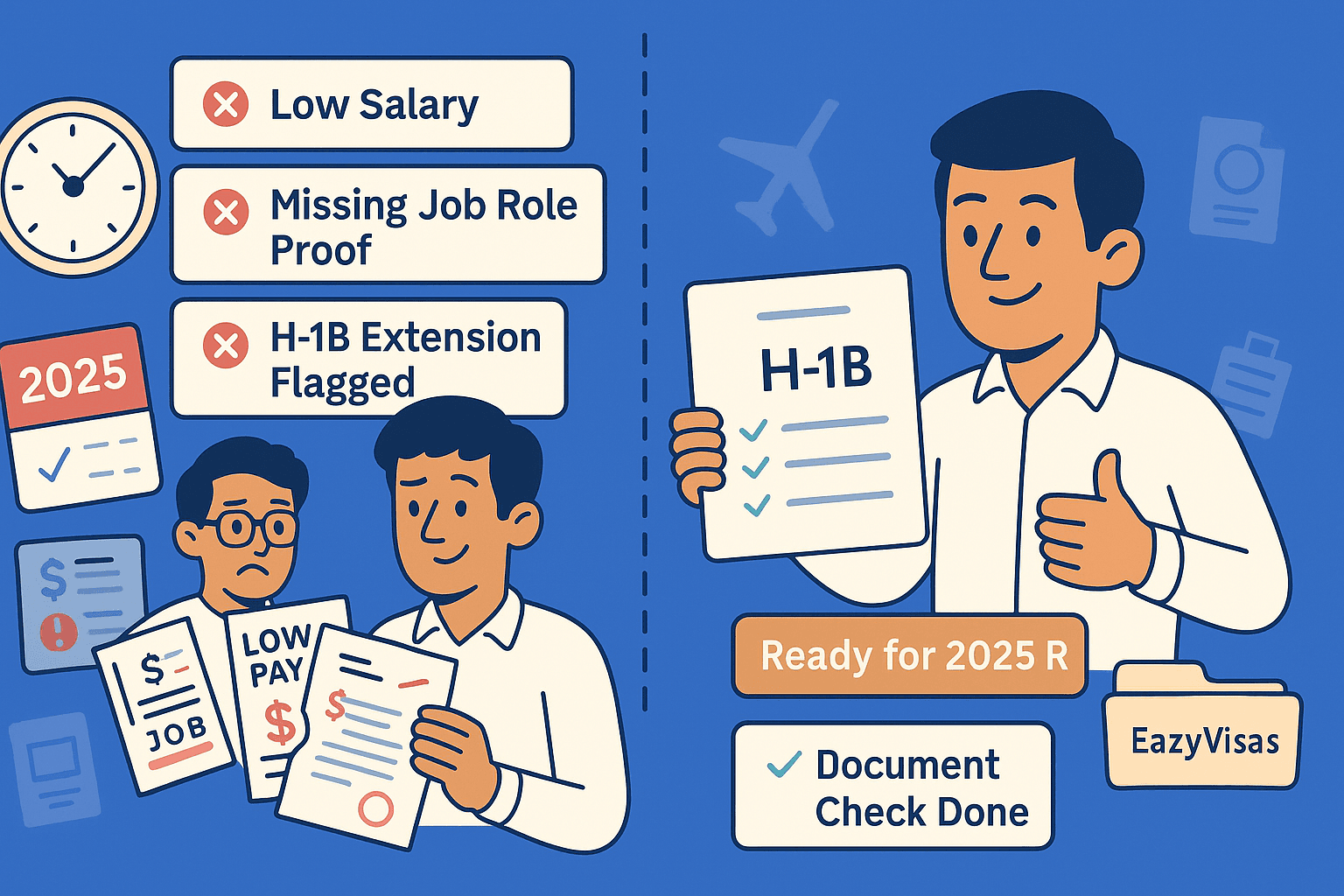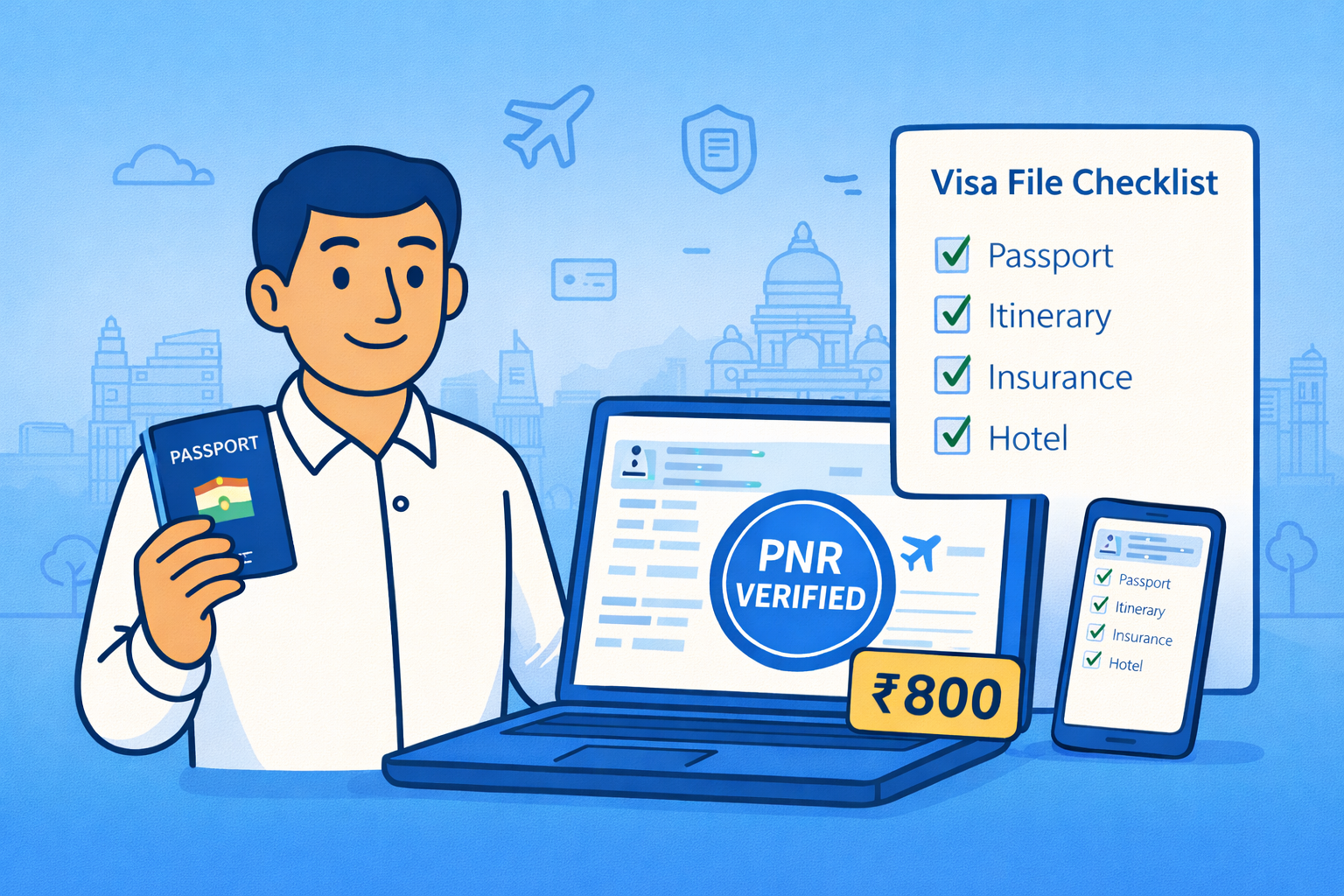The H‑1B visa overhaul 2025 is coming. The H‑1B visa changes 2025 mean many new rules. If you want a U.S. work visa, you must act fast.
These new H‑1B visa changes 2025 include salary level selection, stricter extension process changes, and new visa rules. The U.S. plans a total H‑1B visa overhaul 2025 that affects every applicant.
All this in a simple way for quick action.
What Is the H‑1B Visa Overhaul 2025?
The H‑1B visa overhaul 2025 is a major update. The H‑1B visa changes 2025 aim to reshape how U.S. grants work visas.
Here’s what’s included in the H‑1B visa overhaul 2025:
- New H‑1B salary level selection 2025 to pick high-paying jobs first
- Stricter H‑1B visa new rules 2025 on job types and employer roles
- Updated H‑1B extension process changes with extra paperwork
- More focus on real skills and high-demand specialties
This overhaul is not small. It makes the system fairer but tougher. You must plan now for the H‑1B visa changes 2025.
The H‑1B visa overhaul 2025 is not just about small updates. It changes how the entire H‑1B program works. Before, luck and timing played a big role. Now, skill level and job quality matter more.
The U.S. wants to make sure only strong candidates get selected. That’s why they added H‑1B salary level selection 2025. If your job pays more, you move ahead in the line.
The new rules also stop fake job offers and low-pay jobs from slipping through. The H‑1B visa new rules 2025 ask for clear proof that the job is real, well-paid, and needed in the U.S.
For those already on H‑1B, the H‑1B extension process changes add new checks. Your salary must still meet standards. Your job role must stay the same or be updated in records. If not, your extension can be denied.
So if you're planning to work in the U.S., or are already on H‑1B, these H‑1B visa changes 2025 affect you directly.
You need to act early, understand the new rules, and prepare all documents. A single missing paper or low offer can now stop your approval.
Need help understanding the changes? EazyVisas helps Indian tech workers apply under the new system and adjust to the full H‑1B visa overhaul 2025.
H‑1B Visa New Rules 2025: What’s Different?
The new H‑1B visa new rules 2025 will enforce:
- Higher minimum salary thresholds
- Clear job descriptions matching U.S. labor needs
- Proof of degree and skill level
- Employer accountability in hiring
These H‑1B visa new rules 2025 mean you must have better documentation. Weak or low-wage jobs may be rejected under the H‑1B visa overhaul 2025.
The goal of the H‑1B visa new rules 2025 is to make sure only real, skilled jobs get approved. That means the U.S. wants workers who bring real value not cheap labor.
You must now show that your job is needed in the U.S. It must match what U.S. employers are allowed to hire for. If the job role is too simple or pays too little, it may not pass the new rules.
Also, your documents must be stronger than before. The U.S. will check your degree, your resume, your company’s history, and even the job location. These checks are part of the bigger H‑1B visa overhaul 2025.
Employers must also follow the rules. They can’t just send in quick applications anymore. They need to prove that you meet all requirements and that your role is real and in demand.
These H‑1B visa new rules 2025 are meant to stop fake offers, low wages, and unclear job roles. They want to protect the system and only bring in top talent.
That’s why you must prepare early. Make sure your offer is solid, your pay is high enough, and your documents are ready.
Understanding H‑1B Salary Level Selection 2025
A key part of the H‑1B visa changes 2025 is H‑1B salary level selection 2025. Jobs paying more get priority.
There are four salary levels:
- Level 1: Low wage
- Level 2: Mid wage
- Level 3: High wage
- Level 4: Very high wage
The new system will pick applications by salary level. So if you want approval, aim for at least Level 3 pay.
The H‑1B salary level selection 2025 is critical. Make sure your job and contract match a high salary.
The H‑1B salary level selection 2025 is meant to reward real skill and experience. It’s not about who applies first. It’s about who brings strong value to the U.S. job market.
The U.S. wants highly skilled people who are paid fairly. So, if your job offer is too low, your application may get skipped even if everything else is perfect.
Level 3 or Level 4 pay shows that your job needs advanced skills and real knowledge. These levels are what the U.S. wants to prioritize under the H‑1B visa changes 2025.
So, what should you do?
- Ask your employer to offer a competitive salary
- Make sure your job title matches your skills and experience
- Check the U.S. wage level chart for your industry
If your offer is Level 1 or Level 2, your chances will drop under the H‑1B salary level selection 2025 system.
Also, the wage level will now affect H‑1B renewals too. That means your current salary will be checked again during H‑1B extension process changes.
The safest way to move forward is to review your offer carefully. Don't guess get advice from an expert.
EazyVisas helps Indian professionals review their offer letters and match them with the right wage level. We make sure your job meets the H‑1B salary level selection 2025 so you don’t get rejected unfairly.
How H‑1B Extension Process Changes Work
Current H‑1B holders must know about the H‑1B extension process changes. Under the new rules:
- Employers must show new wage offers
- Ongoing salary compliance checks
- More documentation on job duties and hours
These H‑1B extension process changes mean extensions are harder. If your salary drops or job changes, you could be denied.
What Happens If You Miss the New Rules?
If the new H‑1B visa changes 2025 go into effect and you are not ready, you may face:
- Rejection due to low salary under H‑1B salary level selection 2025
- Denied extension because of missing documents from H‑1B extension process changes
- Delay in H‑1B approval due to new H‑1B visa overhaul 2025 rules
That’s why early planning is key. You must know the new H‑1B visa new rules 2025 before it’s too late.
What Indian Tech Pros Should Do Now
If you are an Indian tech pro, follow these steps:
- Check if your job salary meets H‑1B salary level selection 2025 Level 3 or 4.
- Make sure your job details match high‑skill roles under new H‑1B visa changes 2025.
- If you already have H‑1B, ask your employer about the new H‑1B extension process changes.
- Build strong tech skills and high-paying job offers to fit the H‑1B visa overhaul 2025.
- Explore other US work visa options for Indians like L1 or O1 if your job doesn’t match rules.
The H‑1B visa changes 2025 mean Indian tech pros must plan early. Waiting too long can cost you your visa chance.
First, look at your job offer. Does it pay enough? The H‑1B salary level selection 2025 gives priority to Level 3 and Level 4 salaries. If your salary is low, now is the time to negotiate.
Next, review your job title. It must match a real high-skill role in the U.S. Labor list. Titles like “Software Developer,” “Data Scientist,” or “Cloud Architect” usually qualify under the new H‑1B visa new rules 2025.
If you’re already on an H‑1B, don’t ignore the H‑1B extension process changes. Your employer will need to show updated pay, job role, and other documents. If not, your extension may be denied.
Also, work on your skills. AI, cybersecurity, cloud computing, and data roles are in high demand. They help you qualify under the H‑1B visa overhaul 2025 and also get better job offers.
And remember H‑1B is not the only option. Many Indian pros are now switching to the L1 visa for Indian techies (if you work in a global company) or the O1 visa for Indian professionals (if you have special skills or awards).
These are strong US work visa options for Indians if the new H‑1B rules don’t work for you.
Other U.S. Work Visa Options for Indians if H‑1B Overhaul Hits
If the H‑1B visa changes 2025 make it hard, consider these US work visa options for Indians:
- L1 visa for Indian techies: For transfers within global firms. No salary cap issues.
- O1 visa for Indian professionals: For people with high skills or recognition.
- Use these options as an alternative if H‑1B fails under H‑1B visa overhaul 2025.
This helps Indian tech pros keep their US plans alive even if rules change.
How to Prepare H‑1B Applications to Fit New Rules
When you apply, do this:
- Ask your employer to offer high salary (to meet H‑1B salary level selection 2025).
- Provide detailed job contract and duty list as needed by H‑1B visa new rules 2025.
- Prepare extra documents for future H‑1B extension process changes.
- Build your resume and skills to match high-demand roles under the H‑1B visa overhaul 2025.
EazyVisas Can Help You Prepare in Time
At EazyVisas, we guide you step by step through the H‑1B visa changes 2025 and the H‑1B visa overhaul 2025.
We help you:
- Understand H‑1B visa new rules 2025
- Apply high-salary job offers that meet the H‑1B salary level selection 2025
- Prepare for H‑1B extension process changes in advance
- Explore alternate US work visa options for Indians like L1 or O1
Our experts know these changes inside out. We support you so you don’t lose your US visa chance.
What to Do Next
Now is the time to act. The H‑1B visa overhaul 2025 and the H‑1B visa changes 2025 could start soon.
Don’t wait. Talk to your employer about salary levels. Build your tech portfolio. Prepare all documents for possible new extension rules.
And book a free consultation with EazyVisas to stay ahead. We help Indian tech professionals navigate the changes and secure their best visa option before it’s too late.
Conclusion
The H‑1B visa overhaul 2025 brings major changes. The new H‑1B visa changes 2025 mean salary levels, job rules, and extension process will get stricter.
If your current job doesn’t meet the new rules, you must upgrade your case or explore alternate paths like the L1 visa for Indian techies or O1 visa for Indian professionals.
Act now. Build higher salary offers. Follow the H‑1B salary level selection 2025 system. Prepare for H‑1B extension process changes.
With EazyVisas at your side, you can navigate all these changes and still make your U.S. tech career happen.














